Diplomatic Bluebook 2015
Chapter 3
Japan’s Foreign Policy to Promote National and Worldwide Interests
2.Response to Global Issues
(1) Millennium Development Goals/ Post 2015 Development Agenda
The Millennium Development Goals (MDGs) are a set of common development goals with specific numerical targets and with deadlines to be met by the international community in development areas such as poverty reduction, health, and education. Japan takes initiative in the discussions and efforts by the international community in order to achieve the MDGs.
The Post-2015 Development Agenda is scheduled to be adopted in September 2015. The Post-2015 Development Agenda needs to be a framework to address new issues taking into account of changes in the international community by integrating the lessons and experiences gained from the MDGs. Japan proactively takes part in the discussions based on the principle of human security and demonstrates the country’s strong points such as health and disaster risk reduction so as to build a framework where emerging countries, NGOs, and the private sector can cooperate with each other.
For example, at the First TICAD V Ministerial Meeting held in Yaounde (Cameroon) in May 2014, Foreign Minister Kishida, proposed three “vitamins,” as crucial elements for development that promote human security: inclusiveness, sustainability, and resilience. In July, Mr. Norio Mitsuya, State Minister for Foreign Affairs, conveyed Japan’s views at the United Nations Economic and Social Council (New York), in which he particularly pointed out the importance of urban development and disaster risk reduction.
Thirteen sessions of the UN “Open Working Group on Sustainable Development Goals (SDGs)” were held since March 2013, and their reports were submitted in July 2014, containing 17 goals with 169 targets that are to be the basis of the Post-2015 Development Agenda. The UN “Report of the Intergovernmental Committee of Experts on Sustainable Development Financing” was submitted in August. Japan played an active role in these processes as a member state and contributed to the discussions.
A. Human Security
Human Security is a principle aiming at creating a society in which individual persons are protected, at the same time empowering them to solve their own issues and to fully display their own competence. Japan identifies human security as one of its diplomatic pillars and has been working on dissemination and implementation of this notion for more than 10 years through discussions at the United Nations, the use of the UN Human Security Fund established by Japan’s initiatives, and Grant Assistance for Grassroots Human Security Projects. In the discussion on the setting of the Post-2015 Development Agenda, the importance of a people-centered agenda is commonly recognized, reflecting the vision of human security.
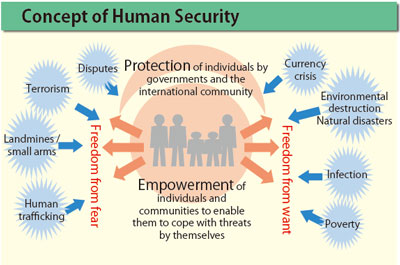
B. Approaches in the Area of Disaster Risk Reduction
Every year, 200 million people are affected by disasters (90% of the victims are citizens of developing countries) and annual average loss incurred by natural disasters is over 100 billion US dollars. Therefore, disaster risk reduction is essential for realizing poverty reduction and sustainable development. Japan, having suffered from a number of disasters, actively implements international cooperation in the area of disaster risk reduction. Due partly to Japan’s strong position in favor of the importance of disaster risk reduction in sustainable development, the SDGs’ report contains a number of targets related to disaster risk reduction. Also in July in Tokyo, at the Global Launch of United Nations Development Programme (UNDP) Human Development Report 2014 attended by UNDP Administrator Helen Clark, Prime Minister Abe stressed that Japan would cooperate with international organizations, including UNDP, and the international community, and would make an active contribution in the area of disaster risk reduction toward building resilience, which is a theme of the Human Development Report. Serving as co-chair of the Resilience Session of the UN Climate Summit (New York) in September, Prime Minister Abe introduced Japan’s international cooperation in the area of disaster risk reduction and called for worldwide cooperation for the success of the Third UN World Conference on Disaster Risk Reduction.
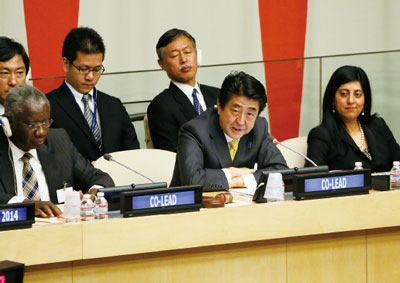 Prime Minister Abe serving as co-chair of the Resilience Session of the UN Climate Summit (September 23, New York; Source: Cabinet Public Relations Office)
Prime Minister Abe serving as co-chair of the Resilience Session of the UN Climate Summit (September 23, New York; Source: Cabinet Public Relations Office)
Taking the opportunity of the Third UN World Conference on Disaster Risk Reduction1 to be held in Sendai, Japan, in March 2015, Japan intends to continuously promote mainstreaming of disaster risk reduction and to integrate it into the policies of each country by sharing the worldwide experience and lessons learned from past disasters.
- 1 A conference organized by the United Nations as a place for discussing global strategies for disaster risk reduction. Japan hosted the first (1994, Yokohama), second (2005, Kobe), and third (2015, Sendai) sessions. At the second session, the “Hyogo Framework for Action” was developed as a guideline for international efforts in disaster risk reduction for the 10-year period from 2005 to 2015. At the third UN World Conference on Disaster Risk Reduction, plans will be made for its successor (Post-Hyogo Framework for Action).
C. Approaches in the Area of Education
In accordance with the Japan’s Education Cooperation Policy 2011–2015, Japan has provided a high quality educational environment to at least 7 million (total of 25 million) children, contributing to achieving MDGs and the goals established in the Dakar Framework for Action, Education for All (EFA)2. Japan also actively participates in education support conferences, such the Global Partnership for Education (GPE) Council, as well as in international discussions for setting the Post-2015 Education Agenda that is to succeed the EFA Dakar Goals.
- 2 Goals adopted at the World Education Forum held in Dakar (Senegal) in April 2000 since there were still many school-age children who were not attending school and adults unable to read, write, and do basic arithmetic, although efforts towards Education for All in the 1990’s had achieved some positive results. The goals include the dramatic expansion and improvement of preschool education, guaranteeing free and high-quality primary education and gender equality in education.
D. Approaches in Agricultural Areas
In coordination with the countries concerned, such as G7 or G20 member states, and international organizations, Japan has delivered assistance for agriculture and rural development in developing countries. In 2014 in particular, Japan acted as a joint facilitator for food security, together with France at the G20 Development Working Group.
E. Approaches in the Area of Water and Sanitation
Japan has continuously been the largest donor in the area of water and sanitation since the 1990’s and has implemented high quality assistance utilizing Japan’s experience, know-how, and technologies. Japan encourages discussions in the international community, and hosted in Tokyo the 2014 World Water Day on Water and Energy and The UNSG’s Advisory Board on Water and Sanitation (UNSGAB) in March and October, respectively.
(2) Global Health
Overcoming health issues that threaten lives and hinder all kinds of social, cultural, and economic activities is directly linked with human security as a common challenge for the international community. Japan boasts the world’s highest longevity of its people and is increasingly expected to play an active role in the area of health. Japan aims to contribute to improve the health of the people in developing countries and create an international community that ensures the right to health through the assistance in the area of health.
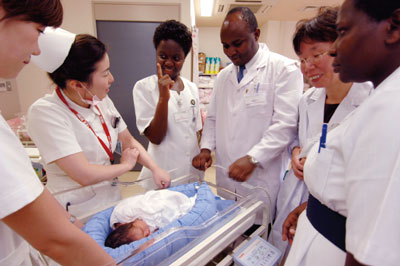 Researchers studying a bed for infants designed to replicate sensations in the womb (June 30, Takatsuki Hospital, Takatsuki City; Source: Kenshiro Imai/JICA)
Researchers studying a bed for infants designed to replicate sensations in the womb (June 30, Takatsuki Hospital, Takatsuki City; Source: Kenshiro Imai/JICA)
Under this principle, Japan has achieved remarkable results in overcoming health issues such as infectious diseases, maternal and child health and nutrition improvements by cooperation with a number of countries and various aid organizations, including the World Health Organization (WHO), the World Bank, the Global Fund to Fight AIDS, Tuberculosis and Malaria (the Global Fund), Gavi, the Vaccine Alliance (Gavi), the United Nations Population Fund (UNFPA), and the United Nations Children’s Fund (UNICEF). However, 3.584 million people still die from three major infectious diseases3 every year and many of 63 million infants younger than five years of age4 and about 290,000 pregnant women5 die from preventable and curable diseases. Therefore, there is an urgent need for enhanced efforts and measures. Along with economic development, response to a new issue of non-communicable disease control has also become necessary in developing countries.
Against this backdrop, Japan identifies health as a priority issue in international cooperation and promotes universal health coverage (UHC) that will ensure all people have access to basic health and medical services, in addition to efforts for achieving MDGs, under Japan’s Strategy on Global Health Diplomacy launched in March 2013. UHC plays a role of correcting domestic differences in access to health and medical care and enables effective resource allocation for diverse health issues by the governments of developing countries themselves. Japan shares its experience with other countries, and stresses the importance of UHC taking opportunity of various international conferences. Japan also provides support for UHC, including via implementation of training, in cooperation with the World Bank and WHO.
Prevention of public health crises caused by emerging and re-emerging infectious diseases, such as Ebola virus disease and new strains of influenzas, is important also from the perspective of human security. Japan is making promotional efforts for developing resilient health systems in each country and enhancing WHO’s International Health Regulations together with the international community.
- 3 WHO Fact Sheet (http://www.who.int/mediacentre/factsheets/fs094/en/#), WHO Fact Sheet (http://www.who.int/tb/publications/factsheet_global.pdf?ua=1), UNAIDS “Global Statistics” (http://www.unaids.org/en/resources/campaigns/2014/2014gapreport/factsheet) Number of deaths in 2013
- 4 WHO Fact Sheet No. 178 (http://www.who.int/mediacentre/factsheets/fs178/en/) Number of deaths in 2013
- 5 WHO Fact Sheet No. 348 (http://www.who.int/mediacentre/factsheets/fs348/en/) Number of deaths in 2013
―Notes from West Africa―
Dispatch of Japanese experts working as part of Japan’s response to the Ebola outbreak
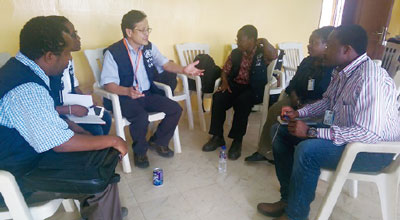 Discussing countermeasures to the outbreak with WHO’s coordinators dispatched to Liberia (Margibi County, December 2, 2014)
Discussing countermeasures to the outbreak with WHO’s coordinators dispatched to Liberia (Margibi County, December 2, 2014)
I was dispatched to Liberia from November 12th to December 24th, 2014, to fight against the Ebola outbreak. From 2000, WHO (World Health Organization) has been pooling experts to be dispatched in case of large-scale infectious disease outbreaks. In this outbreak, through this network, I was dispatched by the Japanese government to the Ebola response team at the WHO country office in Liberia, where I assisted in tackling the Ebola virus.
In the beginning, my role in the team was to assist regional-level responses. Although the number of cases in Liberia was decreasing during the period of my assignment, from mid-November to mid-December, new cases were still being reported every day. Particularly, the disease was still spreading in Monrovia, the capital of Liberia, and this was affecting other regions, where the so-called “hot spots”, places with a large accumulation of infected persons, began to appear one after another. During the first half of the assignment period, I was mainly assisting the aid activities in these regions with the hot spots. In the second half of the period, in addition to the assistance to regional aid activities, I was coordinating the activities of the whole response team, composed of around 40 members from various countries and divided into six teams (i.e. infection control, surveillance, social mobilization.).
The Ebola virus disease is not an infection that is hard to control in nature. However, because the health systems of the three affected countries, including Liberia, were fragile and the response from the international community was slow, this outbreak reached to an unprecedented extent. With the development of regional level integration, the risk of cross-border spread of similar kinds of infectious diseases is steadily increasing. From the viewpoint of forestalling propagation to Japan as well, we need to make our international contributions in responses to these outbreaks even more proactively.
Hitoshi Oshitani,
Professor at Tohoku University Graduate School of Medicine
Dispatch of staff of the Ministry of Foreign Affairs to United Nations Mission for Ebola Emergency Response (UNMEER)
One of the co-discoverers of the Ebola virus, Professor Peter Piot, Director of the London School of Hygiene & Tropical Medicine, during a lecture in November 2014 in Japan, stated that WHO’s incompetence had caused this humanitarian crisis. This is the key to understand the UNMEER, which was established by combining WHO’s specialized knowledge and other UN organizations’ operational capabilities. Although the WHO’s ability includes the capacity of discernment to predict crises based on its specialized knowledge and respond to such crises, WHO leaders started to take practical measures only after June 2014, only when the MSF (Doctors Without Borders) at the frontline had been warning the world that the situation could not be controlled.
Then, in October, the UN established its first mission in the health sector, the UNMEER, under the leadership of the Secretary-General of the United Nations. WFP (World Food Programme), an organization with a high mobility to cope with various situations, procured medical resources, and each organization demonstrated their strength at their best. Many WHO staff members gathered under the UNMEER’s flag, and their activities are being highly praised.
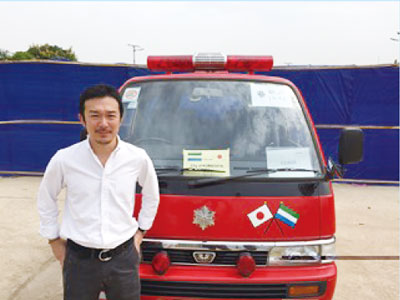 UNMEER Secretary-General’s Special Representative Senior Adviser Konuma (Photo provided by Anthony Banbury)
UNMEER Secretary-General’s Special Representative Senior Adviser Konuma (Photo provided by Anthony Banbury)
When the situation was starting to calm down in this way, I assumed the position of senior advisor to the UN Secretary-General’s Special Representative at UNMEER in December. My role was to make strategic advice. Taking into consideration the possibility to strengthen the affected countries’ capacity to tackle any future spreads, and with Professor Piot’s cooperation, I started up a co-project by UNMEER and the Institute for Health Metrics and Evaluation (IHME), a world-renowned authority in the field of medical data. The last time a health issue became a UN’s urgent task was the AIDS outbreak in 2000. On that occasion, the Global Fund to Fight AIDS, Tuberculosis and Malaria was founded. The international community has paid a huge price due to the Ebola outbreak, and is now faced with a question of how we can avoid this to happen again in the future.
Shiro Konuma,
UNMEER Secretary-General’s Special Representative Senior Adviser
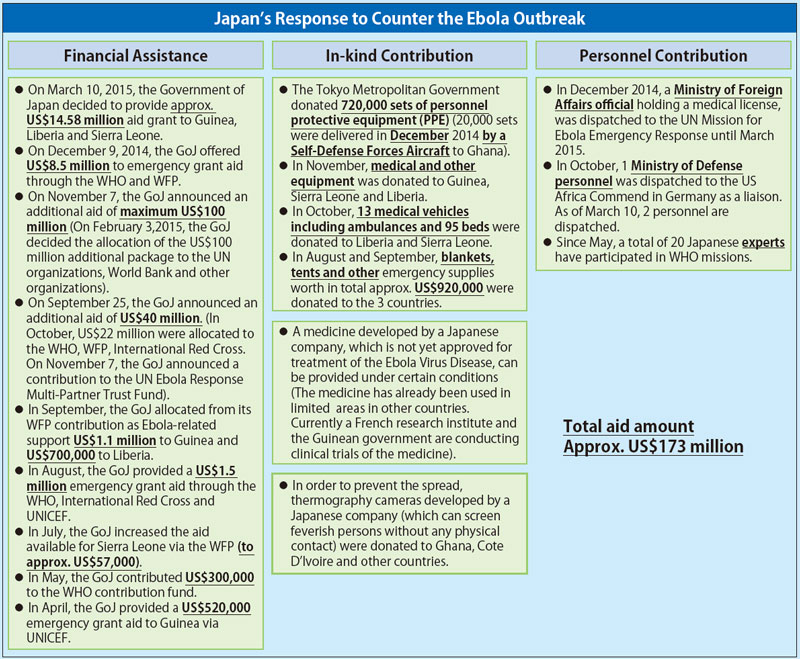
(3) Environmental Issues and Climate Change
A. Global Environmental Issues and Sustainable Development
Through multilateral environmental conventions and various forums, Japan deals with the depletion of resources and the destruction of the natural environment, and is committed to the realization of sustainable development. In September, the Third International Conference on Small Island Developing States (SIDS) was held in Samoa to conduct discussions on sustainable development in SIDS that are prone to environmental issues, including climate change. In November, The UNESCO World Conference on Education for Sustainable Development (ESD) in Aichi-Nagoya and Okayama was co-hosted by the Japanese government and UNESCO. Following the agreement made to strengthen the role of the UN Environment Programme (UNEP) at the UN Sustainable Development Conference (Rio+20) in 2012, the First UN Environment Assembly (UNEA) convened in June 2014 and adopted the Ministerial Outcome Document and resolutions concerning various issues in the area of environment.
(a) Biodiversity
The 12th meeting of the Conference of the Parties to the Convention on Biological Diversity (COP 12) convened in October in Pyeongchang (Republic of Korea), where a mid-term review was conducted on the implementation of the Aichi targets adopted by COP 10 in 2010 in Nagoya, and an agreement was reached to double international financial flows for biodiversity conservation in developing countries. At the same time, the first meeting of the Conference of the Parties to the Nagoya Protocol was held since the Nagoya Protocol entered into force with 50 ratifications.
Illegal trade of wildlife, such as elephants and rhinos, has become of grave concern in recent years and draws much attention as it serves as one of the financial sources for international terrorist organizations. As such, in order to respond to threats to biodiversity in a concerted manner, the international community held the Summit- and Ministerial -level meeting of the Illegal Wildlife Trade Conference in London in February and adopted a political declaration, including initiatives to eradicate illegal wildlife trade.
(b) Forest
Forest reduction and degradation is closely related to such global issues as sustainable development, mitigation and adaptation of climate change, and biodiversity conservation. At the Expert Meeting of the UN Forum on Forests (UNFF) in February and the 50th Council of the International Tropical Timber Organization (ITTO) in November, discussions were held on global efforts for sustainable forestry business. Japan proactively contributed to these discussions, providing continuing assistance as a host country of the ITTO with its headquarters in Yokohama.
(c) International Management of Hazardous Chemicals/Hazardous Waste
Regarding the Minamata Convention on Mercury adopted in October 2013 in Japan, the Sixth session of the Intergovernmental Negotiating Committee (INC) on Mercury was held in November in Bangkok to discuss future work to be done in preparation for entry into force of the Convention.
Also, in November, the 10th Conference of the Parties to the Vienna Convention for the Protection of the Ozone Layer and the 26th Meeting of the Parties to the Montreal Protocol on Substances that Deplete the Ozone Layer were held in Paris and the financial size of the multi-national fund for supporting developing countries was decided. Future discussions were to continue with regard to the handling of hydrofluorocarbon (HFC) which contributes to the greenhouse effect although does not deplete the ozone layer.
(d) Marine Environment
At the 9th Meeting of Contracting Parties to the London Protocol on Marine Dumping, discussions were held by experts about the impact of marine fertilization on marine environments, including iron spraying (e.g., spraying iron for CO2 absorption and the creation of a favorable fishery, etc.), which was newly added to the controlled items.
With regard to the Northwest Pacific Action Plan (NOWPAP) established to protect the environment of the Sea of Japan and the Yellow Sea participated in by Japan, China, the ROK and Russia, the Extraordinary Intergovernmental Meeting was held in Seoul in April and the 19th Intergovernmental Meeting was held in Moscow in October.
B. Climate Change
(a) Overview
A concerted effort by the entire world is essential in reducing greenhouse gas emissions that cause global warming. At the third session of the Conference of the Parties (COP 3) to the UN Framework Convention on Climate Change in 1997, the reduction of greenhouse gas emissions was improved on developed countries. However, the United States did not join this framework, and the obligation was not imposed on emerging countries and developing countries. Therefore, at the COP 16 in 2010, the Cancun Agreement was adopted, which specifies reduction targets and action plans for both developing and developed countries. At COP 17 in 2011, an Ad Hoc Working Group on the Durban Platform for Enhanced Action was established as a process for future international framework, where an agreement was reached that a new legal framework to be participated in by all Parties would be agreed upon by the end of 2015 and be brought into force from 2020. Negotiations are currently underway in accordance with this agreement.
In addition to annual COP meetings, the UN Climate Summit attended by world leaders, was held in September 2014 at the UN Headquarters (New York) and heightened propelled political momentum in climate negotiations. At COP 20 convened in December 2014 in Lima, Peru, the Lima Call for Climate Action was adopted after heated negotiations which resulted in extension of the session for two days. This should lead to the advancement of future discussions.
Japan actively contributes to these international negotiations through various channels, for example, by hosting the third session of the East Asia Low Carbon Growth Partnership Dialogue (chaired by State Minister for Foreign Affairs Minoru Kiuchi), carrying out policy talks on climate change with island countries, presenting the Japan-US Joint Statement concerning funding the Green Climate Fund (GCF), and promoting the Joint Crediting Mechanism (JCM).
(b) UN Climate Summit
At the UN Climate Summit, Prime Minister Abe announced a new assistance schemes for developing countries including human resources development of 14,000 people in the area of climate change, and an “Adaptation Initiative” that would support measures for reducing negative impacts caused by climate change in a holistic manner from planning through to the implementation phase. The Adaptation Initiative places its emphasis particularly on supporting Small Island Developing States (SIDS) and disaster risk reduction. Prime Minster Abe also announced that Japan had achieved the promised assistance to developing countries totaling about 1.6 trillion yen (16 billion US dollars) from public and private sources within a year and half, which was originally announced in FY2013 to be delivered over three years from the 2013 to 2015.
(c) Funding of the Green Climate Fund (GCF)
The Green Climate Fund is a multilateral fund entrusted with the task of operating the financial mechanism of the UN Framework Convention on Climate Change to support measures against climate change in developing countries. Its establishment was decided at COP 16 in 2010, and the GCF was designated as an entrusted entity of the convention at COP 17 in 2011. Prime Minister Abe announced at the G20 Brisbane Summit in November 2014 that Japan would contribute up to 1.5 billion US dollars to the GCF subject to the approval ofthe Diet. The amount of Japan’s contribution is the second largest after the United States.
(d) The 20th Session of the Conference of the Parties to the UN Framework Convention on Climate Change
(i) Overview of COP 20 (December 1–14)
The Japanese delegates were led by Mr. Yoshio Mochizuki, Minister of the Environment. Regarding the post 2020 framework, COP decided the information to be provided by all Parties communicating their intended nationally determined contributions (INDCs) (reduction target). Minister of the Environment Mochizuki held meetings with ministers of seven countries and regions, including Peru (COP 20 Presidency), France (COP 21 Presidency), the EU, the U.K., and China and the heads of international organizations, including Mr. Ban Ki-moon, Secretary-General of the United Nations, and reaffirmed the importance of cooperating toward building on a new framework.
(ii) Statement by Environment Minister, Yoshio Mochizuki
At the high-level segment, Environment Minister, Mochizuki gave a speech and once again advocated the goal of “reducing greenhouse emissions by 50% at the global level and by 80% in the developed world by 2050,” while mentioning that Japan aimed to submit its INDC as early as possible, and that Japan would contribute to reducing the world’s emissions by utilizing Japanese technologies, and advance support, including financial assistance, for mitigation actions and adaptation by developing countries.
(iii) The Joint Crediting Mechanism (JCM) High-level Roundtable
JCM is a framework in which developing countries are provided with those technologies, products, systems, services and infrastructure which lead to reduction of greenhouse gases and in the process the contribution on the part of Japan to greenhouse gas emission reductions or removals in developing countries is evaluated in a quantitative manner to be used for achieving Japan’s emission reduction target. The number of signatory countries increased from 9 to 12 in 2014. JCM High-level Roundtable was held bringing together the 12 signatory countries to the JCM, where a joint statement was announced, welcoming the development of the JCM and expressing the shared will to make further progress in its implementation.
(e) Inter-regional approaches
The 12th Informal Meeting on ‘Further Actions against Climate Change’ was held in Tokyo with the attendance of negotiators in charge from both developing and developed countries. In July, the Policy Dialogue on Climate Change in Small Island Developing States (SIDS) was held in Tokyo inviting the governments of SIDS and international organizations who are influential in climate change negotiations. In October, the Third East Asia Low Carbon Growth Partnership Dialogue was held in Yokohama, chaired by State Minister for Foreign Affairs Minoru Kiuchi, inviting government officials in charge of policies in Asian countries.
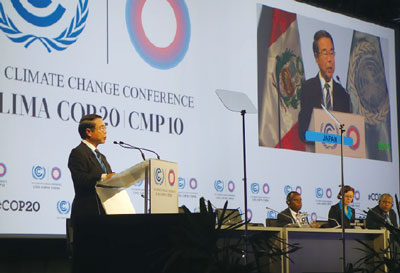 Environment Minister, Mochizuki, giving an address at the high-level segment of COP 20 (December 9, Lima, Peru)
Environment Minister, Mochizuki, giving an address at the high-level segment of COP 20 (December 9, Lima, Peru)
(4) Arctic and Antarctic
A. Arctic
(a) Current situation in the Arctic and Japan’s View
Environmental change in the Arctic, caused by global warming (melting of floating sea ice, permafrost, ice floor, and glaciers), has brought about new possibilities to the international community, such as utilization of the Arctic Seas Routes and resource development. On the other hand, it has also triggered various challenges such as acceleration of warming and negative impact on a vulnerable natural environment.
It is necessary to take measures in response to these potentials and challenges through broad international cooperation, by scientifically shedding light on the actual condition of environmental change in the Arctic and its impact on the global environment, accurately predicting changes, and reach common international understanding on appropriate manners of economic use of the Arctic. Ensuring behaviors and attitudes based on the rule of law in the Arctic is essential. Based on this recognition, Japan will be actively involved in international discussions on the Arctic, utilizing advanced science and technology as well as knowledge and experience built upon years of research and observation experience in the Arctic.
(b) Active Participation in the Arctic Council
The Arctic Council (AC)1 is a multilateral political consultation framework mainly for countries in the Arctic. Japan was formally admitted as an observer in this council in May 2013. Subsequently, Japan has sent government officials and researchers to related meetings, including the Senior Arctic Officials (SAO) meeting, working group meetings, and taskforces, etc., contributing to the AC’s activities by playing an active role in the discussions.
In order to demonstrate Japanese commitment to the Arctic, Japan has participated in the international conferences on the Arctic such as Arctic Frontiers (January 2014, Norway) and the Arctic Circle (October 2014, Iceland), while having held opinion exchanges on the Arctic with relevant countries, including the Arctic states.
- 1 The Arctic Council (AC) is a high-level and intergovernmental consultative body established in 1996 by eight Arctic states (Canada, Denmark, Finland, Iceland, Norway, Russia, Sweden, and the United States). The AC aims to promote cooperation/harmony/exchange among the Arctic states in terms of common Arctic issues (sustainable development, environmental protection, etc.), with the involvement of the indigenous communities.
B. Antarctic
(a) The Antarctic Treaty
The Antarctic Treaty signed in 1959 set forth the following three basic principles: (1) the use of the Antarctic for peaceful purposes, (2) freedom of scientific investigations and international cooperation, and (3) a freeze on territorial rights and claims.
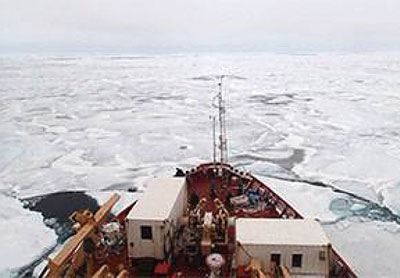 An icebreaker conducting Arctic observation (Source: National Institute of Polar Research)
An icebreaker conducting Arctic observation (Source: National Institute of Polar Research)
(b) The Antarctic Treaty Consultative Meeting (ATCM) and Environmental Protection
Environmental protection in the Antarctic, Antarctic observation, management of the Secretariat of the Antarctic Treaty, and Antarctic tourism are the themes of the annual Antarctic Treaty Consultative Meeting. Particularly in recent years, active discussions are held on the impact of annual tourism activities on the environment of the Antarctic zone and the appropriate management of tourism in this area.
In addition, environmental protection of the Antarctic has been promoted in accordance with the Protocol on Environmental Protection to the Antarctic Treaty.
(c) Japan’s Antarctic Observation
Based on the Ⅷth six-year plan of the Japanese Antarctic Research Expedition (2010–2015), Japan is undertaking to reveal the roles and impacts of the Antarctic on the global system of the past, current, and future; particularly through long-term continuous observation for investigating the actual state and mechanism of global warming, as well as through the implementation of various research and observation activities, using large aperture atmospheric radar, etc.

